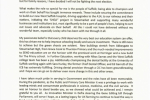On the 14th June 2019 three new interim general licences were issued for the killing or taking of certain wild birds in England.
On 4th May, following a request from the Chair of Natural England, the Secretary of State for Environment, Food and Rural Affairs took on decision making for the purposes covered by the general licences revoked by Natural England on 25th April. This action was considered appropriate and necessary in order to respond to the urgency of the situation.
Following this, officials initiated an evidence-gathering exercise which allowed all concerned parties to explain the impact that Natural England’s withdrawal of its three general licences GL04, 05 and 06 had on the ground. DEFRA received more than 4,000 responses and have since been carefully considering all the evidence received, alongside additional relevant evidence, in order to determine next steps.
The evidence gathered through this exercise demonstrated a range of impacts that individuals and groups experienced as a result of the revocation of licences GL04, 05 and 06, including crow attacks on lambs and ewes during lambing, the risk of predation for eggs and fledglings of birds of conservation concern, and public health issues caused by pigeons in urban areas; for example.
A summary of the evidence and the government response will be published shortly.
New Licences
The new general licences cover species and specified purposes considered appropriate in light of the information gathered by the Department for Environment, Food and Rural Affairs.
Having sought the views of user groups on the useability of different potential licensing options, the three new general licences seek to minimise some of the negative impacts that resulted from the withdrawal of the previous licences.
The licences will allow users to control certain species of wild birds in order to:
- conserve wild birds and flora or fauna (WML GL34)
Species covered: Carrion Crow, jackdaw, jay, magpie, rook, Canada goose, Egyptian goose, monk parakeet, ring-necked parakeet, sacred ibis and Indian house-crow
- preserve public health or public safety (WML GL35)
Species covered: Carrion crow, jackdaw, magpie, feral pigeon, rook, Canada goose and monk parakeet
- prevent serious damage to livestock, foodstuffs for livestock, crops, vegetables, fruit, growing timber, fisheries or inland waters (WML GL36)
Species covered: Carrion crow, jackdaw, magpie, feral pigeon, rook, woodpigeon, Canada goose, Egyptian goose, monk parakeet and ring-necked parakeet
Users can continue to apply to Natural England for an individual licence for control of herring gulls, and now for lesser black-backed gulls. Due to their poorer conservation status, these species have not been included in the new general licences. In terms of control of nests and eggs, their breeding season for this year is largely complete. Natural England is developing a new class licence for these species to be ready in good time for next year’s breeding season.
European protected sites are subject to specific EU law requirements given their particular importance to conservation. These include a process for ensuring that any impacts on the site are properly considered before any plan or project can be undertaken, known as a Habitats Regulations Assessment (HRA). There are a number of ways in which people can continue to carry out control on European protected sites – which include Special Areas of Conservation (SACs), Special Protection Areas (SPAs) – as well as Ramsar sites. For instance, they can apply to Natural England for an individual licence if they are not already covered by an existing individual licence or the specific circumstances provided for by Natural England’s three recent general licences (carrion crow, Canada goose and woodpigeon). Users who already have an individual licence issued since 25 April 2019 can continue to operate under that should they wish.
At this stage the three new general licences will not apply to European protected sites, or to land within 300 metres of those sites. DEFRA will continue to work closely with conservationists, farmers, landowners, pest controllers, gamekeepers and all interested stakeholders in order to quickly develop solutions that may be available for activity on protected sites.
Next steps
There is a need for further work to explore in more detail, with longer time for consultation, some of the issues around the use of general licences.
The new general licences will be valid until 29th February 2020. In the meantime colleagues in government will carry out a review with the objective of providing a long term licensing solution which balances the needs of users and wildlife.
It is intended that an initial public consultation will be launched by the end of the summer, working closely with Natural England, who have already indicated the need to examine a wider range of general and class licences.
It is right that we have a robust and effective licensing system in place. DEFRA Ministers and officials will continue to focus efforts on ensuring that licence users are fully supported in the light of this new approach.
Users of the DEFRA General Licences can contact the response centre: on 0330 159 1986 or [email protected].
